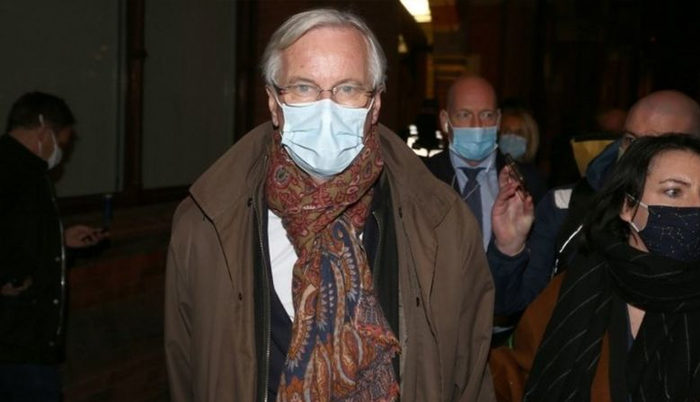
Michel Barnier at St Pancras railway station in London
LONDON, Nov 28 (NNN-AGENCIES) — The UK and EU resumes face-to-face Brexit trade talks in London this weekend, as negotiators race to reach a deal before a looming deadline.
It comes after EU chief negotiator Michel Barnier left a period of self-isolation after a colleague tested positive for Covid last week.
Ahead of travelling to the UK, he said the “same significant divergences persist” in negotiations.
After arriving, he said he would work with “patience and determination”.
Earlier, Boris Johnson insisted the likelihood of a deal depended on the EU.
Speaking on Friday, the prime minister told reporters that “there’s a deal there to be done if they want to do it”.
But he added “substantial and important differences” remained between the two sides, with just over a month left before a December deadline.
Negotiators are striving to strike a deal to govern their trading relationship once the UK’s post-Brexit transition period ends in January 2021.
Talks have been continuing via video link for the past week or so, after the positive Covid-19 test in a member of Barnier’s team.
Barnier travelled to London after briefing EU ambassadors and members of the European Parliament on talks.
“In line with Belgian rules, my team and I are no longer in quarantine. Physical negotiations can continue,” he wrote on Twitter.
Ahead of in-person talks getting back under way, his UK counterpart Lord David Frost pledged to “do my utmost” see if a deal is possible.
“It is late, but a deal is still possible, and I will continue to talk until it’s clear that it isn’t,” he tweeted on Friday.
He added that any deal would have to “fully respect UK sovereignty,” including over fishing waters and a regime for subsidising businesses.
“An agreement on any other basis is not possible,” he added.
Asked about the chances of an agreement, Johnson said the “likelihood of a deal is very much determined by our friends and partners in the EU”.
He added that a trade agreement would “benefit people on both sides of the Channel,” but insisted the UK could “prosper mightily” without one.
“Everybody’s working very hard – but clearly there are substantial and important differences to be bridged, but we’re getting on with it.”
The UK left the EU on Jan 31, but it is continuing to follow the bloc’s rules until the end of the year as part of an 11-month transition period.
If a trade deal is not agreed by then, trading between the two will default to World Trade Organization (WTO) rules.
The EU and UK can keep negotiating if they want to after this, but the two sides would face import taxes on goods traded between them.
The UK would have no access to the EU’s energy market, and no agreement on police and judicial co-operation.
Fishing has been a major flashpoint in the talks, along with post-Brexit competition rules and how any deal would be enforced.
The two sides are also at odds over how closely the UK should have to follow the EU’s social, labour, and environmental standards after the transition.
They are also haggling over how any rules in this area – including on “state aid” support for businesses – would be enforced as part of the agreement. — NNN-AGENCIES
